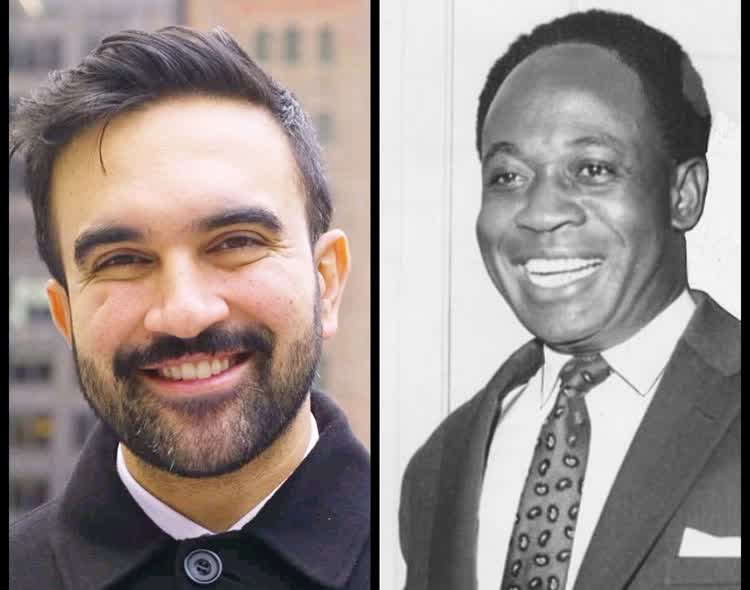
Osagyefo Dr. Kwame Nkrumah, Ghana’s founding President and one of Africa’s most revered visionaries, has once again made an imprint on global political consciousness — this time, in the heart of the United States.
Zohan Kwame Mamdani, the newly elected Mayor of New York, has brought Nkrumah’s ideological legacy to the forefront of American politics after declaring himself a “Democratic Socialist” and publicly identifying with Nkrumah’s principles of social justice, equity, and collective progress.
Born to Ugandan and Indian parents, Mayor Mamdani carries not only a symbolic name but also a deep ideological connection to the late Ghanaian leader. He has often stated that his middle name, Kwame, was chosen by his parents in honor of Dr. Kwame Nkrumah — a man they regarded as a “visionary who dreamed of true liberation for Africa and all oppressed peoples.”
Upon assuming office, Mamdani made it clear that his administration would be guided by ideals closely resembling Nkrumah’s political philosophy — a blend of socialism, Pan-Africanism, and self-determination.
“Dr. Nkrumah believed in a world where the working class would no longer be at the mercy of exploitation,” Mamdani said in his inaugural address. “That belief transcends continents and generations. Here in New York, we too can build a society where every worker’s contribution is valued and every family has dignity.”
Resonance of Nkrumahism in the Modern Era
Political observers in both Ghana and the U.S. have noted that Mamdani’s victory marks a resurgence of socialist-leaning politics in America, echoing movements inspired by figures such as Bernie Sanders and Alexandria Ocasio-Cortez. However, Mamdani’s explicit reference to Nkrumah distinguishes him as a leader who bridges global political traditions — connecting African liberation thought with Western progressive activism.
Dr. Ama Kusi Appiah, a political historian at the University of Ghana, noted that Mamdani’s rise symbolizes how Nkrumah’s message continues to resonate across generations.
“Nkrumah’s ideas were not just about Ghana; they were about global emancipation. For a new mayor in New York to identify with him shows how enduring and borderless those ideas have become,” she explained.
Policies Reflective of Nkrumah’s Vision
Mamdani’s campaign was built on a promise to reshape New York’s economic structure through progressive reforms. His proposals include expanding affordable housing, strengthening labor unions, introducing community ownership models, and increasing public funding for education and healthcare — policies that strongly mirror Nkrumah’s post-independence economic strategies in Ghana.
“We are building a city for the many, not the few,” Mamdani stated. “This is what leaders like Nkrumah envisioned — a society organized around human need rather than corporate greed.”
Reactions and Symbolic Pride
In Ghana, news of Mamdani’s ideological tribute to Nkrumah has been met with pride and reflection. The Convention People’s Party (CPP), founded by Nkrumah himself, released a statement praising the new mayor’s acknowledgment of the Osagyefo’s global influence.
“This is a reminder that Kwame Nkrumah’s legacy remains relevant across borders. His message of social equity and collective progress continues to inspire new generations of leaders worldwide,” the CPP said.
Social media in Ghana has also been flooded with discussions celebrating how Nkrumah’s principles — once dismissed by critics as outdated — are being revived by a new wave of global leaders.
Ghana Makes Local Languages Compulsory In All Basic Schools
As Nkrumah once declared,
“The independence of Ghana is meaningless unless it is linked with the total liberation of Africa.”
Today, that vision seems to have evolved beyond continental boundaries, influencing conversations about social justice and governance even in the world’s most powerful cities.
With Mayor Zohan Kwame Mamdani now at the helm of New York’s leadership, many believe Nkrumah’s dream of a world shaped by fairness, equality, and human-centered development is finding new life — not in Accra, but in the towering skyline of Manhattan.